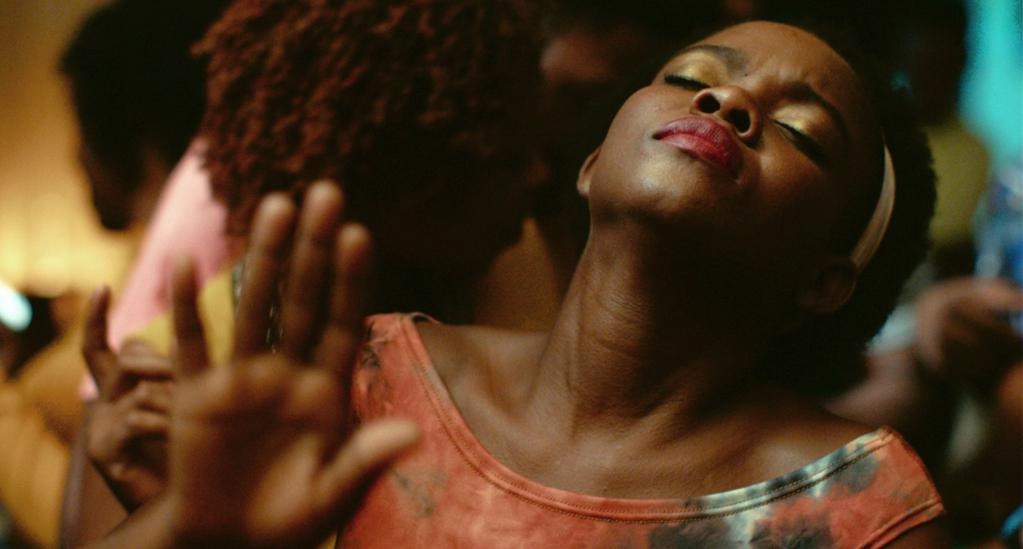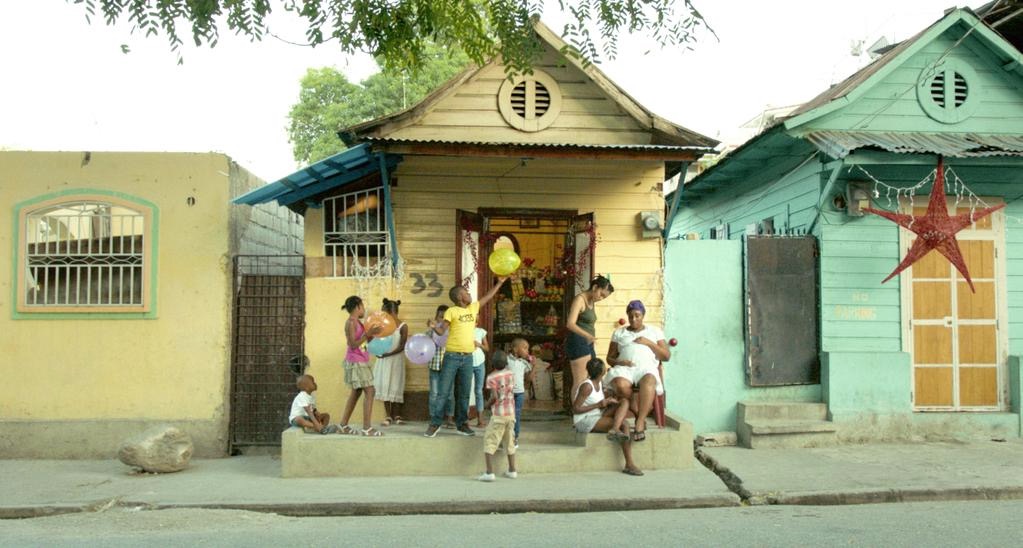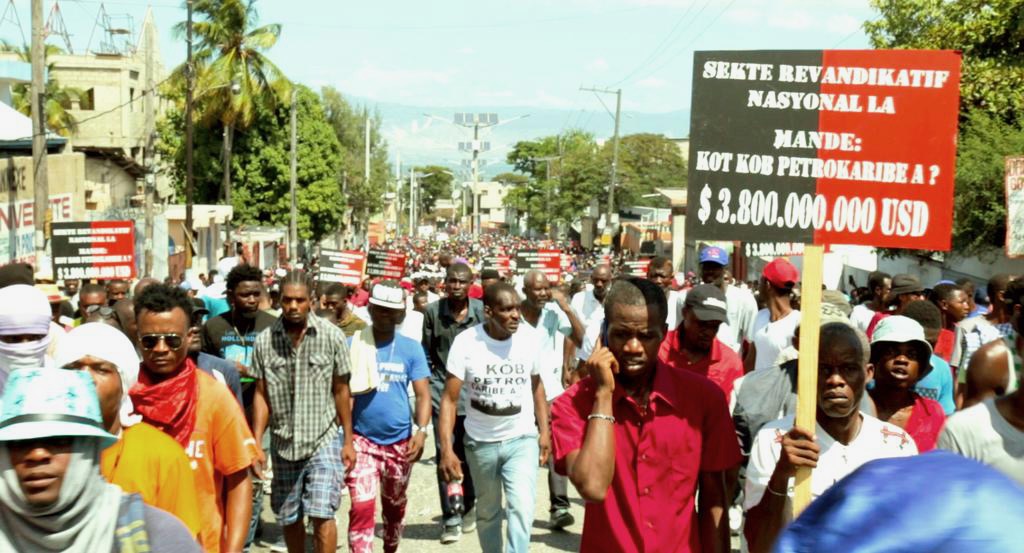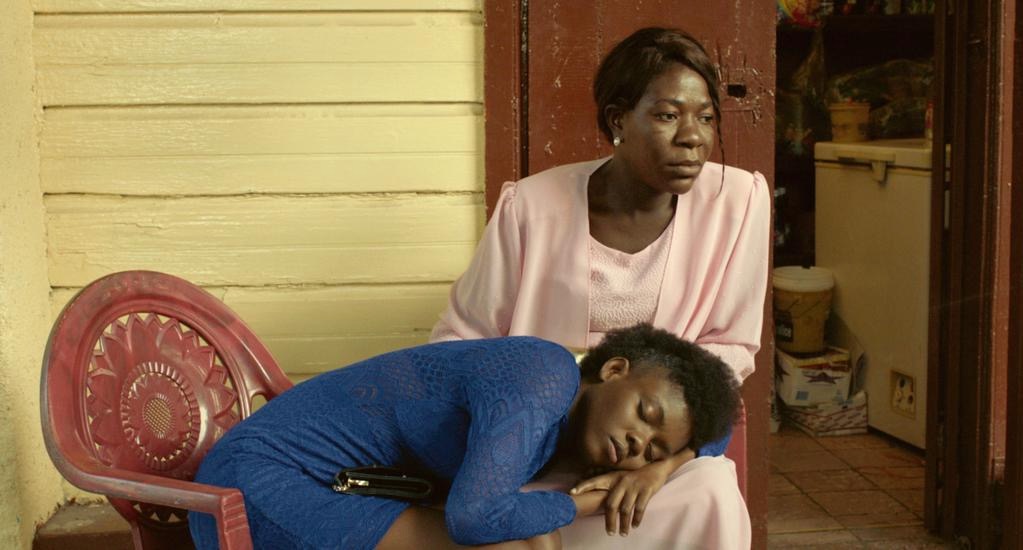Two thirds of the way through Freda, Haiti’s official Academy Award submission this year—its second ever—a young slam poet tells his version of a tale composed in the 1980s by the poet and storyteller Jean-Claude Martineau, who’s also known as Koralen. In Koralen’s legend “Flè dizè” (Ten O’Clock Flower), a beautiful young girl, who is named after a local variety of the ornamental Belle de Nuit flower, is always late to her small rural school because she’s poor and is traveling from far away. After she stops coming to school altogether, her entire class journeys to her remote village, only to discover that she has died. In the contemporary version, written by the Haitian rapper D-Fi, today’s Flè dizès are young women from Haiti’s katye popilè, poor urban neighborhoods, where “young men sell the dream of a sleepless love, hunger extinguishes love,” and some have no choice but to “open their legs before their hearts.”
These are among the quandaries facing the young people in Freda, written and directed by the actress and singer Gessica Généus, one of Haiti’s best-known creative artists. The film made “Un Certain Regard” selection at this year’s Cannes Film Festival, and Francis Ford Coppola recently joined as its executive producer. Set in 2018, during a wave of anticorruption protests demanding the resignation of Haiti’s then president, Jovenel Moïse, who has since been assassinated under increasingly murky circumstances, Freda chronicles the days and nights of the eponymous character, an expressive anthropology student and restaurant worker played by Néhémie Bastien, her mother Jeannette (Fabiola Rémy), her sister Esther (Djanaïna François), her brother Moïse (Cantave Kerven), and her friend Géraldine (Gaëlle Bien-Aimé). Géraldine is a restaurant manager who is rejected by her boss’s son, the father of her unborn child, because they are from different social classes: he is rich, and his skin is lighter than hers.
In the opening scene, a flashback, a much younger Freda is ironing her immaculate white school uniform when one of her mother’s boyfriends sexually assaults her. This is one of many daily nightmares, including the relentless blasts of gang-related gunfire, from which Freda is constantly trying to awaken. While Esther and Géraldine look to men like the characters in the telenovelas the young women watch as a form of escapism, Freda would rather be a “goddess, a warrior,” with a partner who will stand with her and fight. If he can.
In fact, Yeshua, Freda’s boyfriend, played by the Haitian-Dominican actor Juancito Jean, leaves Haiti after he’s wounded in the stomach by a stray bullet while asleep inside a house that was damaged during the 2010 earthquake. A visual artist, Yeshua returns to persuade Freda to join him in the Dominican Republic. She, however, chooses to stay, a decision he finds impossible to understand.
“The country is getting worse and worse day by day,” he tells her. “We risk our lives here, in these streets.” “I can’t leave my family,” she explains.
It is a family that, in Généus’s view, includes the 12 million Haitians who either don’t want to leave or cannot. “Freda represents some of those Haitians,” she told me during a recent Zoom chat from her home in Port-au-Prince. As sunlight filtered through a window, illuminating her art-covered wall, I occasionally heard cars honking, children playing, dogs barking—sounds I also hear when chatting with loved ones who live in the capital. And just as with other friends and family members, we spoke of the Haitian news of the day, of which there was plenty.
There was the kidnapping of seventeen missionaries by a heavily armed gang named 400 Mawozo, a hostage crisis that had been going on for nearly two months. Only five of the missionaries had been released when we spoke. There was the December 14 explosion of an overturned gasoline tanker in the northern city of Cap Haïtien, where seventy-five people had died, and whole blocks had been razed. She asked if I had seen a photograph of a father holding a baby who’d miraculously survived unscathed from a house that had been reduced completely to ashes. I had not. She was still processing a New York Times article describing how, right before his July 7 assassination, President Moïse was said to be preparing a list to deliver to the US government of Haitian politicians and business people involved in the drug trade.
While writing the screenplay, whose timespan includes a months-long period often referred to as peyi lòk, when large demonstrations took place almost every day, Généus read a Superior Court of Auditors and Administrative Disputes report that described how, between 2008 and 2016, funds that had been accumulated through Haiti’s participation in Venezuela’s oil-purchasing program, Petrocaribe, were embezzled or pocketed by government officials. She posted on Facebook an image of herself holding a handwritten sign that read “The state’s money is not your mother’s and father’s money,” adding the mushrooming hashtag “Kot KòbPetroCaribeA” (Where’s the Petrocaribe money?) Généus constantly tweeted her support for her fellow “Petrochallengers” and took part in demonstrations, which are shown, documentary-style, throughout the film.
Advertisement
I first met Généus in December 2006, in the southern coastal city of Jacmel, at the third annual Jacmel Film Festival, where Le Président a-t-il le SIDA?, a film directed by Arnold Antonin in which she starred, along with Jimmy Jean-Louis, about a popular musician who contracts AIDS, was screened in front of thousands of people crammed onto a beach one gorgeous evening. My father had spent the final months of his life bedridden with pulmonary fibrosis in New York, and I had watched a seventeen-year-old Généus’s first film, Barikad (2001), directed by the Haitian filmmaker Richard Sénécal, over and over with him as he was dying.
In Barikad, Généus plays a pampered princess who fiercely objects to a love affair between her brother, scion of their bourgeois family, and the housemaid. In 2006, Généus starred in Cousines, also directed by Sénécal. Other films followed, among them Kareem Mortimer’s 2017 Bahamian human trafficking drama Cargo, in which the cargo in question includes Généus’s character, Celianne, a single mother, who works as a waitress to earn enough money to be smuggled by boat, along with her young son, from the Bahamas to Florida.
Freda touches on migration as well. Freda’s brother Moïse joins a Brazil- and Chile-bound exodus, based on the real-world movement that first began after the 2010 earthquake, which became better-known to the rest of the world this past September when thousands of Haitians traveling from Central and South America arrived at the US–Mexico border, where some were chased by Border Patrol agents on horseback.
Freda is the second film Généus has directed, and it’s the only one in which she does not appear. Her directorial debut was the 2017 documentary Douvan jou ka leve (The Sun Will Rise), a deeply personal account of her mother’s living with bipolar disorder, her own concern about inheriting the condition upon becoming a mother herself, and the tensions between Haitian Vodou and missionary-led, as well as homespun, Christianity. Douvan jou ka leve opens with a dark-skinned girl in a communion dress skipping, hopscotch-style, around an empty Catholic church that is filled with pale-faced angels and saints. The images of those alabaster saints recall Freda’s white American evangelical preacher, who decries Vodou as evil while bedding young women in the congregation who desperately need money and other favors from him.
Like Freda, more than half of Haiti’s population, an estimated 54 percent, is under twenty-five years old. Some of these young people’s passions and concerns are debated in lively discussions by Freda’s fellow university students, who deliberate on everything from colonialism and foreign aid to methods of governing (democracy vs. dictatorship) and protest (revolution vs. dialogue), even as unpaid professors go on strike and students are sometimes unable to make it to class for lack of transportation. Généus understands that the assortment of problems these young people face—domestic and sexual violence, religious hypocrisy, corruption, colorism, and migration—might seem to make for a heavy load.
“These are not necessarily themes,” she told me. “They are more like the water we drink every day. They are issues that people are facing in their daily lives. If I didn’t address them, I would feel like I was censoring.”
Généus also does not mute or censor more ordinary youthful rituals, including joyful gatherings and celebrations, such as dancing the night away at Yanvalou, a popular café-bar, or chatting on a rooftop with a sibling, or having a romantic rendezvous on a hilltop overlooking Port-au-Prince. “What these young people are also asking for is so little in the grand scheme of things,” Généus said, echoing Freda’s often expressed desire for peace of mind.
“To create a full portrait of these types of characters, there are many places I needed to go,” Généus told me. One direction she leaned toward was to deeply question the usefulness of her art. Before she began filming Freda, even as she was tweeting nonstop and marching in the streets, she felt helpless.
Advertisement
“I needed to be using my strengths, what I do best,” she said. “My art gives me a kind of freedom that I don’t feel I have in person. I’m not in the government or the judiciary, yet my work can speak to sources of power, be it inside or outside of Haiti. This film can travel to so many places I myself cannot go.”
Art has always been one of the copious means by which Haitians interpret their joys and struggles, be it through politically engaged music—including carnival songs—dance, literature, painting, sculpture, and increasingly, filmmaking in Haitian Creole. At a time when Haiti and Haitians are constantly subjected to sweeping generalizations—that their country is the poorest in the Western hemisphere, the kidnapping capital of the world—Généus powerfully underscores the individual human dramas of Freda and her family, through the stories of their lives, precarious yet sometimes joyful, in one urban neighborhood in the world’s first Black republic.
Apart from its captivating tale and powerful performances, Freda has generated much buzz—and has also been celebrated by thousands of Haitians, myself included, because it offers some balm against bad news coming out of the country. Some, including the 75,000-strong, Washington, D.C.–based diaspora organization Haitians Ladies Network, have been using the hashtag #FredaOscar2022 to try to ensure that Généus’s film travels as far and wide as possible—as far, perhaps, as the Academy Awards in March.
Right before we spoke, Généus was interviewed by CBS news anchor Vladimir Duthiers. He asked her what it felt like to have the hopes of 12 million people riding on her shoulders. She wept.
After she and I spoke, later that same day, Haiti’s soup joumou, or liberty soup—consumed by the potful on January 1 to commemorate the 1791–1804 revolution when Haitians gained their freedom from colonial France—won recognition as a new addition to the UNESCO’s Intangible Cultural Heritage of Humanity list. And then, too, the remaining twelve missionaries apparently escaped from captivity.
To paraphrase Freda’s boyfriend, Yeshua, who sees the sunlight filtering through the cracks in his earthquake-damaged bedroom wall as a sign that his ancestors are still watching over him: as fragile and precarious as life might be, there remains much to celebrate.






